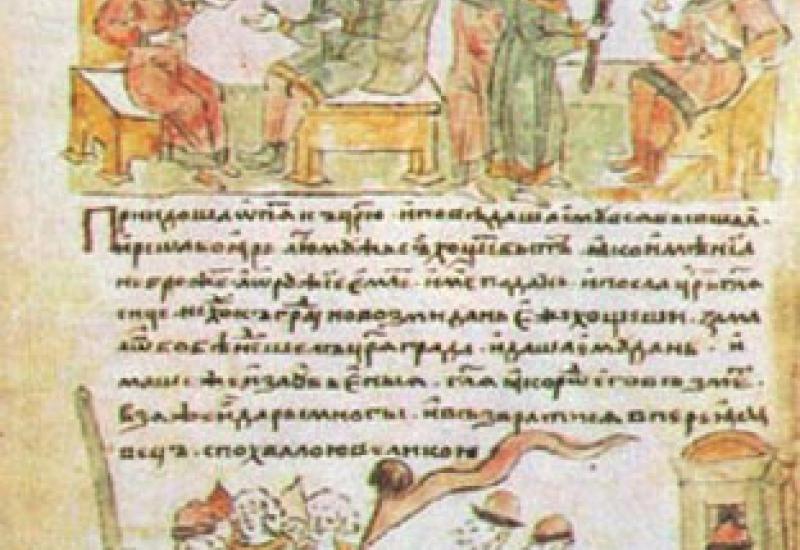Probably, all students and staff NTUU "KPI" know that the university is located in a part of Kiev, which has the historical name Shuliavka. Some probably know that to 1898 when surveyors came here to plan the construction of the territory of the future institute, there was "Sapernoe field" - a small military training ground, which borders the village Shuliavka and occupied the territory with some village houses. But very few people know the origins of the name - Shuliavka.
Origin of the name Shuliavka is considerably dimmer than the names of other historical areas of Kiev. And while the historical events connected with the city names are not preserved in the memory of an ordinary inhabitant of Kyiv, their etymology is transparent. Indeed, well, who needs to explain what words came from the name "Gonchary", "Kozhumyaki", "Tatarka", "Pechersk" or, say, "Solomianka"?
But if it comes to the title "Shuliavka" unequivocal opinion does not exist. Although, at first glance, there are also all clear: the version that the word "Shuliavka" comes from the "hawk –shulika in Ukranian" - the name of a bird of prey, which once lived in these areas, is spread so far. Professor University of Kiev Vladimir Shcherbina defended this point of view most consistently. He wrote: "I think it (the name - Ed.) is derived from the name of a bird ("shulika "), as well as other names of many places near Kiev (scoops, Buslovka ). "Interestingly, even the computer when I type these lines, corrects the word "Shulyavka" to "Shuljak", although I don’t believe that creators of the program editor have read the works of Ukrainian historian of the late XIX - early XX centuries.
However, there are other hypotheses, including very exotic. For example, some believe that the name "Shuliavka" comes from the word "shui" or "Shuitsa" in old Slav language- "left hand." According to this version the old Kiev surrounding area is considered as a projection of the human body with the right hand (“desnitsa”) near the river Desna, head - in the area of the Vyshegorod and the left hand - in the western suburbs, where, in fact, is Shuliavka.
However, most scholars believe, that the name is derived from the name of the ancient "Shelvovogo Seltso" that is mentioned in chronicles in the story about the events of 1160. This period went down in history as a time of princely strife, and in the story of the development of one of the hardly understandable today intrigues it is mentioned that Kiev prince Rostislav Mstislavich with his soldiers "stood at Shelvovogo Selco under Borky." Historians believe that the modern Shuliavka located on the site of the "Selco" and "Borki", and therefore adopted, except for the place, and somewhat modified its name.
But whence it comes the word "Shelv", "Shelvo?" Recall in the modern Ukrainian language there are still the words "shalivka", "shelevka", "shelovka." This is a name for thin planks - thin strips of wood, which are used to upholster the houses. Derived from these words are verbs "shelevaty", "shalyuvaty" (stud planks). these words are recorded in some Russian dictionaries, including a classic, composed of more than 140 years ago, Vladimir Dal dictionary.
There is no need for any research to see that the words "shelov", "Shelvov", "shelevka", "shelevaty" are refered to the same morphological series. The same one as the half-forgotten word "shulo" or "Shula" as it was called until recently (and in some places is called now) posts, to which fence links or fences are attached. There has, in general, the full identity of the root word "Shuliavka." So, the question is closed?
Yes, but ... pay attention to the fact that in the annals it is used only possessive adjectives "Shelvovogo", "Shelvova." That is, words that indicate affiliation of the words Seltso and Bork with some Shelvey. Among the Christian, or as they are called, there is no such calendar names. However, for many centuries the people of Russia in parallel with Christian names have also Slavic. There are among the names recorded in annals - Vladimir, Svyatoslav, Dobroslav, Dobrogostove, Vseslav, etc., and very expressive names of boyars and warriors - Dobrynia, Rjabets, Tverdiata, Gudi, Pauk, Grom. However, the person named in the period in Shelvey chroniclers was not mentioned.But at other times and in other circumstances such a name existed. A few decades before this time, in another Russian land among warriors Prince Daniel Galitsky you can meet certain governor Shelvey. Of course, this is not the owner of the Bork and small village near Kiev, and yet …. The main thing is that the name was the same, and it was quite common. Most likely, its origin is obliged concept embodied in the words with roots "shul", "shel". And it does not mean birds of prey, or any projection of it but a reliable fence, its node.It is not for nothing that the name was given to the military leader, which must be durable and reliable. Perhaps it is these qualities possessed and the owner of land on the outskirts of Kiev, due to which his name will forever remain on the map of the capital.
Dmitry Stefanovic

